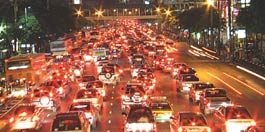home | north bay bohemian index | features | north bay | feature story

Car Culture
Gassed Up
By Novella Carpenter
I've traveled to a strange land where the poor control the country, strangers are friendlier to me than most of my family members and gas ballparks at 20 cents a gallon.
Venezuela itself is beautiful, a lush tropical country full of birdsong and mango trees. On the streets of Caracas, fruit vendors sell grapes, papaya and fresh-squeezed juices.
But also omnipresent is the horrible stench of cars, buses and the two-stroke engines that define Latin America. In Venezuela especially, the problem persists because of the incredibly cheap gas. There's a great subway system, but what's the incentive to use it?
One of the numerous pleasant people I met, Alfredo, took me for a drive to show me the country. At one point in the journey, he realized he was almost out of gas. We stopped at the station and I thought I should offer to pay for fuel, a tradition I carry out with my friends. But Alfredo explained to me that buying a liter of gas in his country costs only 100 Bolivars. That's about 5 cents. Since there are about four liters to a gallon, gas costs around 20 cents a gallon. Essentially, gas is free.
This abundance of cheap fuel creates a car culture so strong that it threatens to overwhelm Caracas. Traffic is a constant. Day or night, the highways and overpasses are clogged with cars and trucks. Intrepid mopeds and motorcycles squirm in between the jams, dousing the air with their plume of two-stroke diesel exhaust and noise. The cars are enormous. Huge land boats from the 1970s oil boom troll around the barrios, or ranchos, as they call them in Venezuela. They often act as taxis. For the rich, SUVs and Range Rovers are the vehicles of choice.
There's an agreement, too, with driver and walker. The driver trumps all no matter what the situation is.
Even a woman with a baby stroller has to stop and wait for a car to turn before she makes her way across the street. I was honked at repeatedly for crossing a street in a crosswalk, with a "Walk" sign. People walking consistently yielded to cars. It was only when a mob of people dared walk out onto a crosswalk that cars would stop.
That's an apt metaphor for what's happening in Venezuela. There has been an enormous population boom in the last 20 years, especially in the ranchos. And with this growth came wide support for Hugo Chavez, a popular military hero. He has--surprisingly for a politician--reallocated a lot of the petroleum wealth of Venezuela to a variety of social programs. Though the rich of Venezuela don't believe these misiones are happening, I actually saw them in action.
Oil money is funding literacy, medical, and art projects throughout the country, mostly in the barrios. Deals with Cuba, sweetened with discounts on oil, led to thousands of Cuban doctors and agronomists coming to Venezuela to help the sick and teach farming methods. This is the good side of oil wealth.
And for Venezuela, the wealth doesn't look to end anytime soon. Recent predictions (no one really knows) put Venezuela as the country with the largest reserves of oil in the world, more than Saudi Arabia, Iran and Iraq combined. In an interview with the BBC a few days ago, Chavez said he'd like to set the price for a barrel of oil at $50. He will call for this steady price when the oil cartel OPEC meets in Caracas in June. People who don't like Chavez call this greedy and unfair. People who like him think it's generous.
Call me a chavista, but the price seems wildly low, especially in light of recent predictions of hundred-dollar barrels in the future. But as much as Chavez is called a dictator, he does actually seem to be a fair person. I hope one day he'll address the issue of pollution and reduce the use of petroleum, and I'm optimistic he might just do that.
Chavez is up for re-election this winter, and it's predicted the 80 percent of the population, mostly the poor, will vote for him again. And why wouldn't they--a leader takes oil money to directly help the people? Talk about a strange and wondrous land!
Send a letter to the editor about this story.
|
|
|
|
|
|